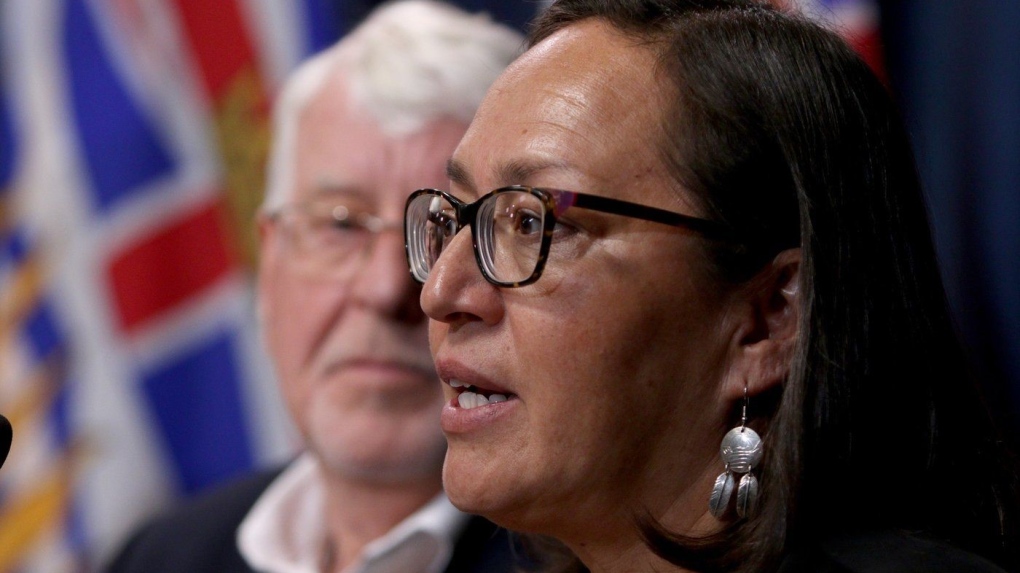First Nations women overrepresented among B.C. toxic drug deaths: doctor
 Dr. Nel Wieman with the First Nations Health Authority speaks about the illicit drug toxicity deaths in the province and about the effect on First Nation's communities during a press conference at B.C. Legislature in Victoria, B.C., on Monday, February 24, 2020. THE CANADIAN PRESS/Chad Hipolito
Dr. Nel Wieman with the First Nations Health Authority speaks about the illicit drug toxicity deaths in the province and about the effect on First Nation's communities during a press conference at B.C. Legislature in Victoria, B.C., on Monday, February 24, 2020. THE CANADIAN PRESS/Chad Hipolito
The top doctor at British Columbia's First Nations Health Authority says Indigenous people, especially women, are dying from toxic drugs at disproportionately high rates as the overdose crisis continues “unabated,” nearly seven years after the province first declared a public health emergency.
Dr. Nel Wieman, the acting chief medical officer, says illicit drugs are killing First Nations people at five times the rate of B.C.'s general population.
She says that figure rose to 8.8 per cent for First Nations women, specifically, compared with non-Indigenous women in the province in the first half of 2022.
That number contrasts with the overall toll for the province, which shows 79 per cent of those who died from toxic drugs last year were male.
Wieman's remarks came as B.C.'s chief coroner released data Tuesday showing suspected drug toxicity claimed 2,272 people last year, and as B.C.'s exemption to federal drug laws took effect, allowing adults to carry small amounts of certain illicit substances without fear of being arrested or having their drugs confiscated by police.
She says the underlying reasons for the increased impact of the toxic drug crisis on First Nations people in B.C. are “complex and varied,” including intergenerational trauma stemming from Canada's residential school system and the apprehension of Indigenous children for placement in government care, along with a lack of access to culturally safe mental health and substance use supports.
“There are also the impacts of ongoing events, including the discovery of the unmarked graves of children who attended residential schools, various climate change emergencies and the COVID-19 pandemic,” Wieman told a news conference where the annual statistics were released.
Substance use and mental health are closely linked, she said. People use substances to change how they feel, and the health authority's response to the crisis involves helping people develop healthier coping mechanisms while expanding harm reduction and treatment options rooted in Indigenous values and culture.
“We recognize that seeking treatment alone, in the standard western format, may not meet the needs of all First Nations people,” Wieman said.
“Offering treatment that's grounded in culture and ceremony addresses (that), addressing the underlying trauma will have a better longer-term outcome.”
Many people have died while using drugs alone, in private homes, where no one was around to call for help, Wieman noted.
“Stories have been shared with us of women who used substances privately, because of the fear they have of losing their children or personal supports.”
The illicit drug supply is “unpredictable and so incredibly dangerous that people risk their lives by accessing it even once,” Wieman said.
Chief coroner Lisa Lapointe said Tuesday that a range of measures are urgently needed to address the crisis,including expanded access to safe prescription alternatives, drug-checking services, overdose prevention sites and a “continuum of care” involving treatment, recovery and medical and mental health support options.
This report by The Canadian Press was first published Jan. 31, 2023.
CTVNews.ca Top Stories

Canada Post removes deadline for Santa letter program amid strike
Canada Post says it has removed the deadline for its Santa Claus letter program amid an ongoing national workers' strike that has halted mail delivery leading up to the holiday season.
Young Manitoba woman dies after medical emergency during dental appointment
The Manitoba Dental Association (MDA) said it is investigating a critical incident where a young woman from the Morden-Winkler area died following a dental appointment.
South Korean parliament votes to defy president by lifting his declaration of martial law
South Korean President Yoon Suk Yeol declared martial law late Tuesday, vowing to eliminate 'anti-state' forces as he struggles against an opposition that controls the country's parliament and that he accuses of sympathizing with communist North Korea.
After meeting with Trump, Trudeau to brief opposition leaders
Prime Minister Justin Trudeau will meet with all opposition leaders today before question period to brief them about his meeting with U.S. president-elect Donald Trump.
Jewish pro-Palestinian protesters occupy Ottawa parliament building
A group of Jewish-Canadian activists protesting Israel's ongoing armed offensive in Gaza have occupied a parliamentary building in Ottawa on Tuesday morning.
Toronto library apologizes after staff at east-end branch refuse to help lost girl
The Toronto Public Library is apologizing after staff at a branch in the city’s east end refused to provide a lost child with access to a telephone.
2 Ontario men charged after police seize US$40M in suspected cocaine from tractor-trailer in Illinois
Two Ontario men are facing charges after police in the U.S. say they seized 540 kilograms of cocaine from a tractor-trailer along Interstate 80 in Illinois.
Quebec prisons on lockdown after correctional officer severely beaten
Quebec prisons were in lockdown on Tuesday after a correction officer at the Sorel-Tracy detention centre was attacked this week.
This salad brand is being recalled again. Here's why
A Taylor Farms salad kit is being recalled over concerns of a salmonella contamination, according to the Canadian Food Inspection Agency.

































